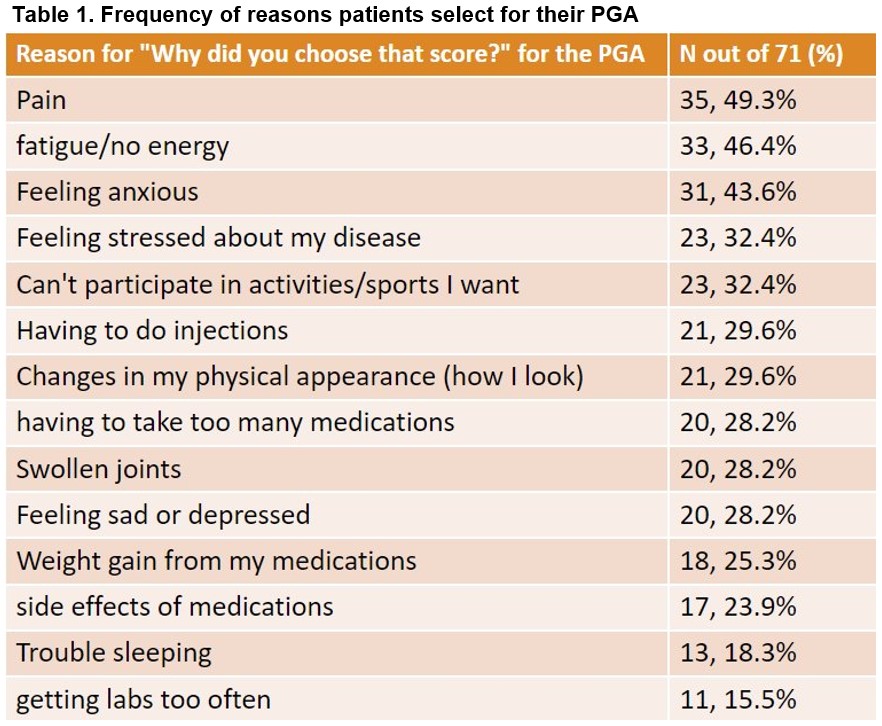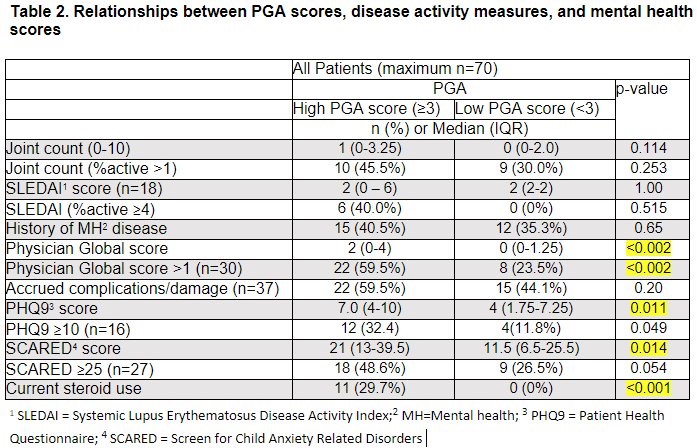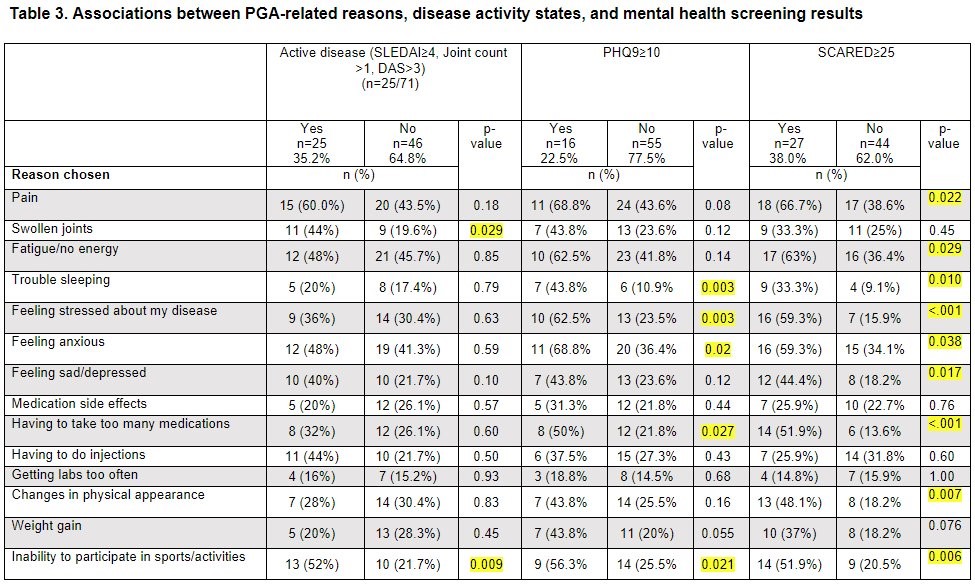Session Information
Session Type: Poster Session B
Session Time: 10:30AM-12:30PM
Background/Purpose: Rheumatic disease in childhood significantly alters a child’s quality of life. The patient global assessment (PGA) score is a clinical and research tool that measures the impact of disease on a patient’s quality of life on a scale of 0 (no impact) to 10 (high impact). Rheumatologists apply these scores in real time to aid in clinical management. Previous studies have shown a discrepancy between the PGA and objective disease activity measures. This study aims to explore patients’ self-reported reasons for their PGA score, and the role of anxiety and depression in particular.
Methods: This is a cross-sectional, single-center, survey-based study. A total of 71 patients 12-18 years old with JIA or SLE were recruited and administered a survey including the PGA, Patient Health Questionnaire-9 (PHQ9) and Screen for Childhood Anxiety Related Disorders (SCARED). A follow up survey was sent four weeks after initial screening to request feedback on the shared materials and assess patient comfort in the screening process. Associations with high (≥3) and low (< 3) PGA scores and mental health scores and reasons for selecting a PGA were analyzed using appropriate nonparametric tests. A Spearman correlation coefficient was calculated to look at the relationship of the PGA to other variables.
Results: Seventy-one patients were enrolled during the study period. Twenty-seven patients had clinically significant symptoms of anxiety and 16 had moderate or worse depression. 54.9% of all patients self-indicated feeling anxious, stressed or sad as a reason for their chosen PGA score. Patients with PHQ9≥10 or SCARED≥25 were more likely to select those reasons for their PGA than those with lower/negative PHQ9/SCARED screener scores. In contrast, patients with clinically active disease were more likely to attribute swollen joints and inability to participate in sports to their PGA. Those with significant depression had a higher median PGA score of 4.5 (2.5-7, p = 0.009), than those without depression. Most patients (87%) who responded to a feedback survey felt that it was somewhat or very helpful to get resources about mental health in rheumatology clinic and 95.7% felt that it was helpful to talk to their rheumatologist about emotions and mood.
Conclusion: Anxiety and depression influence how many children with rheumatic disease view the impact of their disease on their quality of life. Patients with clinically significant symptoms of depression and anxiety were more likely to have higher PGA scores and attribute their PGA score to trouble sleeping, feeling stressed about their disease, feeling anxious, feeling sad/depressed, having to take too many medications, and inability to participate in sports/activities than patients without anxiety, reporting a worse experience of their rheumatic disease, regardless of disease activity. These are important factors to consider when applying PGA scores in research studies. Moving forward, the community must develop efficient ways to better understand the reason behind a child’s PGA score within the rheumatology clinic setting.
To cite this abstract in AMA style:
Powers I, Ziniel S, Sheeder J, Bloom J, Pitts B. Why Did You Choose That Score? – Associations Between Patient Global Assessment Scores and Mental Health in Patients with Juvenile Idiopathic Arthritis and Systemic Lupus Erythematosus [abstract]. Arthritis Rheumatol. 2024; 76 (suppl 9). https://acrabstracts.org/abstract/why-did-you-choose-that-score-associations-between-patient-global-assessment-scores-and-mental-health-in-patients-with-juvenile-idiopathic-arthritis-and-systemic-lupus-erythematosus/. Accessed .« Back to ACR Convergence 2024
ACR Meeting Abstracts - https://acrabstracts.org/abstract/why-did-you-choose-that-score-associations-between-patient-global-assessment-scores-and-mental-health-in-patients-with-juvenile-idiopathic-arthritis-and-systemic-lupus-erythematosus/



